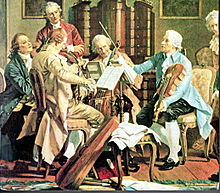[contextly_auto_sidebar id=”yE1qQT5mZx5Qd5zgZ5bpUcatdi77vObm”]
HOW can classical music survive in a changing world? How can the aging audience be renewed? One answer is coming from a Boston group called Groupmus e, which puts on free, informal chamber concerts at people’s homes, then passes the hat for the musicians.
e, which puts on free, informal chamber concerts at people’s homes, then passes the hat for the musicians.
So far, this hasn’t generated a huge amount of income for the players, but it’s giving them an appreciative place to play, and showing a young audience that classical music does not have to be stuffy or staid. A Boston Globe article describes it this way:
The unorthodox party was organized by Groupmuse, a website that matches up people who want to volunteer their home for a semi-public classical musical performance with musicians and guests. Tonight, a string quartet is playing a selection of works by Mozart and the “Notturno” from Alexander Borodin’s String Quartet No. 2 in D major, to a rowdy crowd of about 30, mostly people in their 20s. Some knew the hosts previously, others are strangers who signed up online. To the right of the performers is a set of bongo drums on a minifridge.
There’s been a similar series in Los Angeles, which I expect is more raucous than the Boston version, called Classical Underground, for several years now. (The guy who runs it, a Russian painter, is a real wild man.) I wrote about it in this story:
The intense and mustachioed Alexey Steele looks out over this motley crowd gathered in his Carson loft — a high-ceilinged, concrete floor box squeezed between a cargo mover and a church — and can’t contain his excitement. “I am practicing art as an extreme sport!” he shouts, followed with a honking laugh that sounds like a throttled sea bird. Then he is off — shouting exhortations at friends, hugging others, kissing still others on both cheeks — before the concert starts.
For what it’s worth, the concerts I’ve seen as part of Classical Underground have all been excellent. (It’s not just shtick.)
The larger crisis of classical music — which, incidentally, is hardly “dead” — will not be entirely solved by these underground salons, as engaging as they are. Musicians need institutions (an subscription series, and donors, and press coverage, and record labels, and so on) to support what they do. But these gigs are a step in the right direction.
And I like way Sam Bodkin, one of the key figures behind Groupmuse, sees things. “Classical music doesn’t need to be saved,”he told The Globe. “This world needs saving. We need to show what classical music can do for the world.”

I think part of the problem is that the ‘business model’ for chamber music has never been viably self-supporting. From its earliest orgins in the courtly music of the C13th and C14th (Machaut, Landini, Dufay etc) through to Brahms and Schumann – chamber music has traditionally been the plaything of wealthy noblemen who could afford to indulge their passion for listening to it, and even (Frederick II, Count Esterhazy) playing it themselves. A second manifestation of chamber music is that written for domestic performance – in an age when you had to learn an instrument if you wanted to enjoy music, long before the gramophone or cd.
It’s not really surprising this music isn’t commercially viable in the concert hall – it doesn’t really belong there anyhow 🙂
Mr. McGowan makes a good point… In fact, much of what we call the fine arts predates our current style of market capitalism. They’re not always well-suited to the current model; it’s something neoliberals have no answer for.